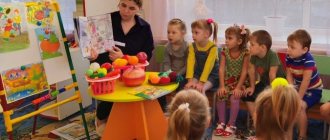Card index of conversations “Ethics and culture of behavior” in the preparatory group for school
Alla Kovaleva
Card index of conversations “Ethics and culture of behavior” in the preparatory group for school
Card index of conversations “ Ethics and culture of behavior ”
in the preparatory school group
№ Problems
1 Conversation “ Cultured Man ”
Invite children to talk about what
a cultured person , to generalize, supplement and concretize their ideas.
Teach children to analyze and draw conclusions using examples of various situations. 2 Conversation “Ethical and unethical actions”
Consider different situations with the children, discuss which people did the right thing and who broke the rules.
Teach children to compare their desires and actions with ethical and moral standards, accepted rules of behavior .
3 Conversation “In the world of polite words”
Invite children to speak out about who can be called
a cultured person , stimulate the desire to be polite.
4 “Learning to communicate with peers”
.
Enrich children's communication experience and introduce them to different behavioral .
Bring to the attention of children various situations, discuss how to behave in each of them: how to politely address, why you should give in, what kind of help you need to provide to a friend, how to avoid conflict, etc. 5 Conversation “These kind words”
Discuss various situations with the children, find out what polite words need to be used in each of them (thank you for the service provided, say hello, say goodbye, apologize, etc.).
6 Conversation “Who is called modest”
Bring to the attention of children various situations, discuss which of their participants behaves modestly, who is shy;
learn to evaluate and self-assess behavior and its consequences .
7 “Learning to communicate culturally ”
To develop communicative competencies in children: mastery of ways of interacting with people around them, organizing joint activities in
a group , methods of action in communication situations, different types of speech activity (monologue, dialogue)
; the ability to ask questions, conduct a dialogue correctly, seek and find compromises.
8 "I am at a friend's place"
Consider various situations with the children, discuss whether their heroes behaved correctly at a party, what rules they broke.
Formulate general rules of conduct when visiting .
9 Conversation “My attitude towards other people”
Teach children to choose the right line
of behavior towards people in various situations, show with examples that the same model of behavior will be ideal in one case, but unacceptable in another.
10 Conversation “We are going to visit”
Continue to introduce children to the rules
of behavior when visiting , offer to consider various situations, and discuss what to do. Enrich positive communication experiences, expand ideas about behavior in certain situations.
11 Conversation “We know everything, we can do everything”
Teach children to formulate rules
of behavior in certain situations, analyze their own actions to determine their compliance with accepted rules, explain their thoughts and conclusions.
12 Conversation “What a good deed I have done”
Consider with the children various situations that take place in the life
of the group , invite the children to name the good deeds they have committed.
Teach children to find a place for good deeds and be proud of them. 13 Conversation “Why are rules needed?”
Bring to the attention of children various situations, discuss the rules that must be followed. Offer to imagine what will happen if everyone does not act according to the rules, but as he wants. Help to draw a conclusion about why rules are needed.
14 Conversation “Might is not right”
.
Invite children to consider various situations from the life of the group , from their favorite cartoons and fairy tales.
Teach to highlight actions committed from a position of strength, without taking into account the interests of the other side, to show the negative consequences of these actions. 15 Conversation “Let’s make peace”
. To develop in children the ability to understand other people, to teach them to see motives, and not to be offended over trifles. Encourage peacefulness and responsiveness.
16 Conversation “Polite request”
Introduce children to the speech structures of requests addressed to various people
(an older stranger, an older close peer)
. Teach children to choose appropriate options for expressing requests in different situations.
17 Conversation “ Behavior in public transport”
Tell children how to behave in public transport, consider various situations, compare the compliance of
participants’ behavior with the rules ; teach to choose models of good behavior .
18 Conversation “On compliance”
Consider different situations with children. Discuss what qualities their participants display (mutual respect, kindness, mutual assistance, compassion, pity, empathy). Help children: why it is important to be able to give in.
19 Conversation “Farewell to the guest”
Introduce children to the rules at the moment of farewell, consider
behavior in various situations and corresponding speech structures.
20 Conversation “congratulations and wishes”
. Enrich children's vocabulary with speech structures expressing congratulations and wishes. Learn to express ideas about the holiday in appropriate speech structures.
21 Conversation “Who will praise me”
Teach children to see a reflection of a person’s internal state in their external appearance, and to focus on it when building interactions. Learn to use polite words according to the situation.
22 Conversation “Can you be friends”
Introduce children to sayings about friendship and friends, which encourage us to be tolerant of people, to show condescension towards the minor shortcomings of our friends, but not to recognize as friends people who do bad things.
23 Game situation “Polite conversation on the phone”
Teach children to choose the right models
of behavior when talking on the phone with various people, promote the development of appropriate speech structures with children.
Enrich your vocabulary and communication experience. 24 Conversation “How to handle a book”
To update and systematize children’s knowledge about the rules of communication with books. Develop the ability to display rules using symbolic drawings, tell what can happen if each of the rules is violated.
25 "Farewell before bed"
To update and supplement children’s ideas about traditional Russian wishes for the coming sleep, which are addressed to loved ones.
26 Conversation “I’m going to the theater”
To consolidate children's knowledge about the rules
of behavior in public places, to consider various situations that may arise in the theater, to choose optimal models of behavior . Stimulate in children the desire to behave culturally .
Help to master appropriate speech structures. 27 Conversation “Bragger – who is this?”
Teach children to distinguish between boasting and a joke, exaggeration, and to see the negative in boasting. Offer to consider various situations, see how others perceive boasting, how they treat braggarts.
28 Conversation “Learning to show kindness”
Consider different situations with children, discuss how you can show your affection for a person in each of them.
Contribute to enriching communication experience and children’s mastery of various behavioral . Encourage the desire to be friendly towards people; learn to correctly express your emotional state in behavior .
29 Conversation “My phone rang”
Teach children to observe speech
etiquette when talking on the phone; help them master behavioral in various situations and appropriate speech structures.
30 Conversation “I Empathize”
Teach children to be attentive to each other, understand the mood and emotional state of their comrades, express empathy, sympathy, and provide all possible assistance.
31 Conversation “The word “Hello”
.
Consider different situations with the children, discuss which words of greeting are appropriate in each of them. Help to master various behavioral and speech structures used when meeting people of different ages, relatives, acquaintances and strangers.
Enrich children's vocabulary and communication experience. 32 Conversation “My attitude towards other people”
Consider different situations with children, teach them to choose the right line
of behavior , and tactfully express their thoughts and feelings.
33 How to deal with stubbornness in yourself? Discuss with children the differences between a firm position on an issue, the ability to defend one’s opinion, and stubbornness. Talk about why stubbornness is a bad character trait. To develop children's self-regulation skills and





